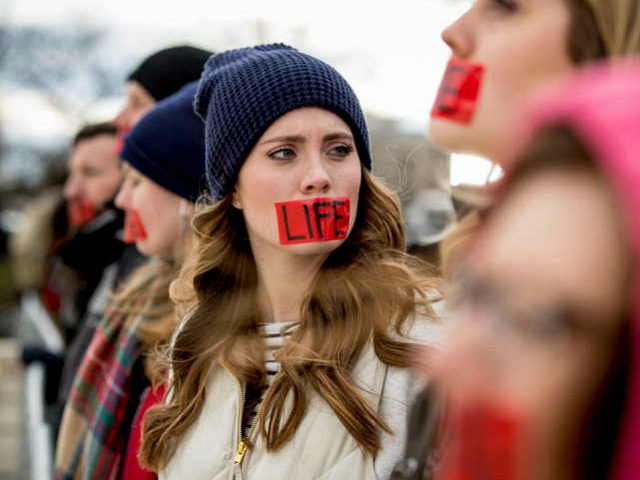WASHINGTON, DC – The Supreme Court on Tuesday ruled 5-4 in favor of pro-life crisis pregnancy centers in California, holding, in an opinion written by Justice Clarence Thomas, that a California law forcing them to post information on where to obtain abortions “likely violates the First Amendment.”
Thomas’s opinion rejected the U.S. Court of Appeals for the Ninth Circuit’s holding that these types of notices, required in the context of state licensing, were a separate category of “professional speech” that did not receive the full measure of the First Amendment’s free speech protections. The ruling also prohibits California from forcing crisis pregnancy centers that are not licensed medical facilities to read clients a script that they are not licensed.
“[T]his Court has not recognized “professional speech” as a separate category of speech. Speech is not unprotected merely because it is uttered by “professionals,” Justice Thomas writes in his opinion.
The law in question, California’s Reproductive Freedom, Accountability, Comprehensive Care, and Transparency Act (FACT Act) was passed in 2011 and the record indicates it was written specifically to burden pro-life center that the California legislature was displeased existed:
“[U]nfortunately,” the author of the FACT Act stated, “there are nearly 200 licensed and unlicensed” crisis pregnancy centers in California. … These centers “aim to discourage and prevent women from seeking abortions.”
If the pro-life centers were licensed clinics, as many were, they had to post and distribute to all women who sought services like ultrasounds, the following message:
California has public programs that provide immediate free or low-cost access to comprehensive family planning services (including all FDA-approved methods of contraception), prenatal care, and abortion for eligible women. To determine whether you qualify, contact the county social services office at [insert the telephone number].
Unlicensed facilities, meanwhile, had to post the following: “This facility is not licensed as a medical facility by the State of California and has no licensed medical provider who provides or directly supervises the provision of services.”
Businesses can be required by law to say or post certain information relating to their trade, when, as a leading case put it, the information is “purely factual and uncontroversial.” But the Court on Tuesday refused to place these statements under this less-protected category of “commercial speech,” ruling, “The notice in no way relates to the services that licensed clinics provide. Instead, it requires these clinics to disclose information about state-sponsored services—including abortion, anything but an ‘uncontroversial’ topic.”
The Court also rejected the idea that these notice requirements were protected as part of the typical state regulation of the practice of medicine, like requiring consent forms.
The National Institute of Family and Life Advocates (NIFLA), a group that represents the pro-life clinics and centers in question, brought suit to overturn the law after pro-abortion groups ran “undercover investigations” to ensure compliance with the notice requirements.
California Attorney General Xavier Becerra, the named defendant in the case, stood by his state’s law in spite of the Supreme Court’s decision:
“No one should be forced by the government to express a message that violates their convictions,” said Michael Farris of the Alliance Defending Freedom (ADF) who represented NIFLA at oral arguments before the Supreme Court. “In this case, the government used its power to force pro-life pregnancy centers to provide free advertising for abortion. The Supreme Court said that the government can’t do that, and that it must respect pro-life beliefs.”
The ADF is the same pro-religious freedom public interest law firm who secure victory for a Coloradan Christian baker who refused to bake a cake celebrating a marriage between two men in the landmark Masterpiece Cakeshop case this month.
Attorney General Jeff Sessions also offered his thoughts in support of the plaintiff pro-life group. “We are pleased that today’s decision protects Americans’ freedom of speech,” he said in a statement, continuing:
Speakers should not be forced by their government to promote a message with which they disagree, and pro-life pregnancy centers in California should not be forced to advertise abortion and undermine the very reason they exist. This Department will continue to vigorously defend the freedom of all Americans to speak peacefully in accord with their deeply held beliefs and conscience.
“California lawmakers, through this law that has now been struck down, attempted to override the First Amendment, forcing private entities to speak messages against their beliefs, and punishing them if don’t comply,” said Tony Perkins, of the Family Research Council, another Christian non-profit who had supported NIFLA’s suit. “That this could happen in America, should be of grave concern to all Americans, regardless of their views on abortion.”
The case is National Institute of Family and Life Advocates v. Becerra, No. 16–1140.

COMMENTS
Please let us know if you're having issues with commenting.